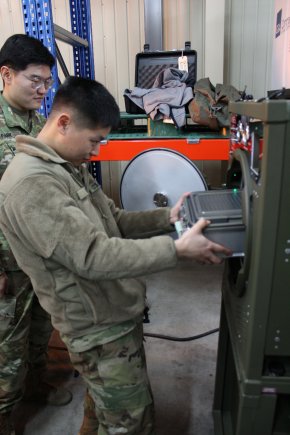121st Combat Support Hospital Becomes First to Field New Sterilizer

Last September, the U.S. Army began fielding a new water-efficient vacuum steam sterilizer for combat support hospitals that only uses 10 gallons of water to process up to 100 loads of sterilized medical instruments.
The fielding of the new sterilizer model P2131 Automated Field Steam Sterilizer retired the model 2151 field sterilizer, more fondly known as the "Bertha," that has been in use throughout the Army since the late 1960s.
On Feb. 17, the 121st Combat Support Hospital became the first CSH to field this new equipment as biomedical and operating room staff were given hands on instruction.
"This new equipment not only brings us into the modern age of sterilization, but allows us to operate more efficiently with medical devices that are dependable regardless of the challenging working environment," said Maj. Hiram Gonzalez, chief sterilization nurse of the 121st CSH.
"The P2131 Automated Field Steam Sterilizer was designed with our medical warfighter in mind," said Christopher Karel, a U.S. Army Medical Materiel Agency employee assigned to Camp Carroll, South Korea. "USAMMA recognizes that the difficult environments associated with a military field hospital and the demands that are placed on the personnel, who transport, set up, operate, and maintain field medical devices. Remote locations often mean resources are scarce and conditions are challenging, but the need to care for combat casualties never changes."
The P2131 brings the most up-to-date steam sterilization technology to the austere environment of a field hospital. The autoclave combines the safety and efficacy of micro-processor controlled pre-vacuum cycles with the ruggedness, portability and reliability required for a variety of harsh environments.
"The P2131 requires minimal maintenance, even in extreme environments. The Water Recovery System helps conserve not only a precious resource, but its durable design ensures that the P2131 operates reliably with every cycle. This will allow us more time to care for troops and save lives," said Gonzalez.
 An official website of the United States government
An official website of the United States government
 ) or https:// means you've safely connected to the .mil website. Share sensitive information only on official, secure websites.
) or https:// means you've safely connected to the .mil website. Share sensitive information only on official, secure websites.


